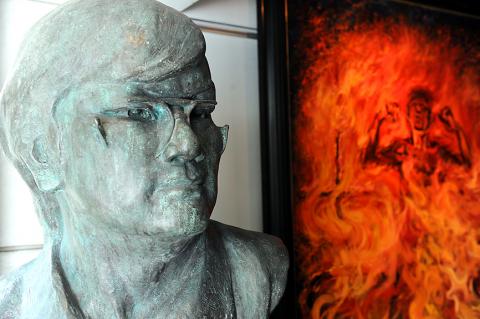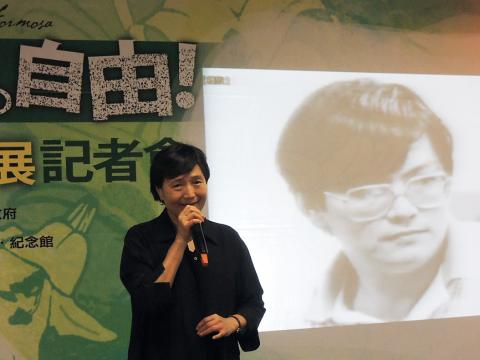The widow of democracy activist Deng Nan-jung (鄭南榕) and politicians yesterday lambasted a decision by National Cheng Kung University overruling the student body’s plan to name a plaza on campus “Nan-jung Square” (South Banyan Square, 南榕廣場) because of the name’s “political connotation.”
The university’s School Affairs Committee voted 70-21 on Wednesday in favor of not naming the area.
In a student poll last month on naming the area, Nan-jung Square drew the largest number of votes — in honor of Deng, an alumnus, and the banyan tree, the school’s symbol.

Photo: Chang Chia-ming, Taipei Times
However, university president Hwung Hwung-hweng (黃煌煇) wrote an open letter to the faculty and student body on Jan. 2, citing Article 6 of the Education Basic Act (教育基本法) and saying the name was inappropriate.
Hwang said the school needed to remain politically and religiously neutral.
On April 7, 1989, Deng, the 43-year-old publisher of the Freedom Era Weekly magazine, set himself on fire in his office in defense of the freedom of expression. Police had tried to arrest him for printing a proposal for a constitution for the Republic of Taiwan in the magazine. His suicide ended a 71-day standoff after he locked himself inside the office.

Photo: Wang Jung-hsiang, Taipei Times
Democratic Progressive Party (DPP) Chairman Su Tseng-chang (蘇貞昌) said on Facebook yesterday that the overruling of the vote by a majority of the student body was the worst example of democratic education.
“The school should be more open-minded about the result of the vote and implement the name. It would have been the best resolution to the issue,” Su wrote.
“Deng gave his life so that full freedom of speech would one day become a reality, and his sacrifice has had a great impact on Taiwan’s struggle for democracy,” Su said.
It was sad that the university overruled a democratic decision due to concerns that the name might have “political connotations,” Su said.
During the committee’s meeting on Wednesday — which was open to all students — history professor Wang Wen-hsia (王文霞) said Deng’s choice of suicide was inappropriate and compared the act to Islamist suicide bombers.
She said Deng should have used another method to overcome his difficulties.
Deng’s widow and former Presidential Office secretary-general Yeh Chu-lan (葉菊蘭) was outraged by Wang’s comment.
“My heart bled,” Yeh said, adding that it was like reopening old wounds for the family.
Yeh said Wang was a disgrace to the nation’s education system, adding that she would demand a public apology.
Wang later said that she respected Deng’s efforts to promote Taiwanese democracy and respected both Deng and his family, but that she simply did not agree with the method he used.
“Self-immolation is an overtly radical method; the spirit of democracy and liberty is respect for life, not hurting onself or others,” Wang said.
Wang’s explanation failed to pacify her critics, with former DPP chairperson Shih Ming-te (施明德) saying he never thought that the university would have such professors.
“How can a person who cannot tell right from wrong teach students,” Shih told reporters at a press conference.
He added that if Taiwanese could accept and honor the sacrifice of the 72 Martyrs of Huanghuagang (黃花崗), they should be able to accept a local martyr like Deng.
New Taiwan Humanities Research Foundation chief executive Huang Hui-chun (黃惠君) said that Deng had sacrificed his life in pursuit of democracy.
“Deng’s self-immolation caused no fear in society. How can he compared to suicide bombers?” Huang said.
Lin Yi-ying (林易瑩), former head of the university’s student club 02 Group (零貳社) — whose name is a phonetic translation of “protest” in Hoklo (commonly known as Taiwanese) — said on Wednesday that the committee’s decision trampled on the democracy of the student body.
The Joint Association of Student Clubs at the university said that they had done all they could and had accepted the committee’s decision.
Huang said it did not really matter what the official name of the area on campus is called. For instance, some people call the National Chang Kai-shek Memorial Hall by other names, such as the Chungcheng Temple, he said.
“Everyone can use a name they want to call the plaza; they can even name it after me,” he said.
Additional reporting by staff writer

MAKING WAVES: China’s maritime militia could become a nontraditional threat in war, clogging up shipping lanes to prevent US or Japanese intervention, a report said About 1,900 Chinese ships flying flags of convenience and fishing vessels that participated in China’s military exercises around Taiwan last month and in January last year have been listed for monitoring, Coast Guard Administration (CGA) Deputy Director-General Hsieh Ching-chin (謝慶欽) said yesterday. Following amendments to the Commercial Port Act (商港法) and the Law of Ships (船舶法) last month, the CGA can designate possible berthing areas or deny ports of call for vessels suspected of loitering around areas where undersea cables can be accessed, Oceans Affairs Council Minister Kuan Bi-ling (管碧玲) said. The list of suspected ships, originally 300, had risen to about

DAREDEVIL: Honnold said it had always been a dream of his to climb Taipei 101, while a Netflix producer said the skyscraper was ‘a real icon of this country’ US climber Alex Honnold yesterday took on Taiwan’s tallest building, becoming the first person to scale Taipei 101 without a rope, harness or safety net. Hundreds of spectators gathered at the base of the 101-story skyscraper to watch Honnold, 40, embark on his daredevil feat, which was also broadcast live on Netflix. Dressed in a red T-shirt and yellow custom-made climbing shoes, Honnold swiftly moved up the southeast face of the glass and steel building. At one point, he stepped onto a platform midway up to wave down at fans and onlookers who were taking photos. People watching from inside

Japan’s strategic alliance with the US would collapse if Tokyo were to turn away from a conflict in Taiwan, Japanese Prime Minister Sanae Takaichi said yesterday, but distanced herself from previous comments that suggested a possible military response in such an event. Takaichi expressed her latest views on a nationally broadcast TV program late on Monday, where an opposition party leader criticized her for igniting tensions with China with the earlier remarks. Ties between Japan and China have sunk to the worst level in years after Takaichi said in November that a hypothetical Chinese attack on Taiwan could bring about a Japanese

STREAMLINED: The dedicated funding would allow the US to transfer equipment to Taiwan when needed and order upgraded replacements for stockpiles, a source said The US House of Representatives on Thursday passed a defense appropriations bill totaling US$838.7 billion, of which US$1 billion is to be allocated to reinforcing security cooperation with Taiwan and US$150 million to replace defense articles provided to the nation. These are part of the Consolidated Appropriation Act, which the US House yesterday passed with 341 votes in favor and 88 against. The act must be passed by the US Senate before Friday next week to avoid another government shutdown. The US House Committee on Appropriations on Monday unveiled the act, saying that it allocates US$1 billion for the Taiwan Security Cooperation Initiative